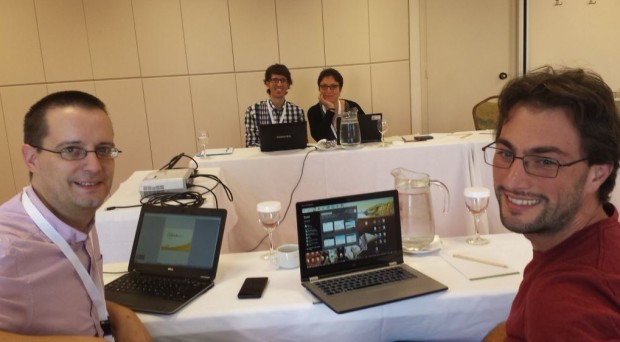
What is PEERE?
PEERE (pronounced Peer-y) is a European project funded by COST (Cooperation in Science and Technology) to improve the efficiency, transparency and accountability of peer review.
The aim as outlined here, in an interview with the Chair of PEERE, Flaminio Squazzoni (University of Brescia), is to bring people together to collaborate on quantitative and qualitative research into peer review and to share data, as appropriate, to address evidence-based initiatives in peer review.
What’s new?
Network analysis and making connections were a reoccurring theme of the workshop.
Anuska Ferligoj (University of Ljubljana) presented data on citation networks on the topic of peer review, showing who cites who – in terms of individuals and groups. The Editorial Board of journals may also impact on these patterns, as shown by Michele Pezzoni (École Polytechnique Fédérale de Lausanne), given that the editorial board defines the publication strategy of a journal.
Various ways to improve the efficiency of peer review were also discussed.
If reviewers were ‘known’ to an Editor (not necessarily personally but the Editor was aware of their work) they were more likely to respond to an invitation to peer review.
Agata Fronczak (Warsaw University of Technology) investigated peer review times in the Biochemistry and Biotechnology section of the Journal of the Serbian Chemical Society here.
She showed that if reviewers were ‘known’ to an Editor (not necessarily personally but the Editor was aware of their work) they were more likely to respond to an invitation to peer review and were more likely to return a report than those who were not known, emphasizing the important role an Editor plays in the process.
Agata also discussed appropriate strategies to speed up peer review and shorten review times, revealing that a combination of inviting reviewers in batches of one ‘known’ and four ‘unknown’ reviewers was an effective strategy to obtain two reviewers who were willing to review a given manuscript.
László Sándor demonstrated here the policies which best motivate pre-social behavior by involving reviewers in a randomized control trial on Journal of Public Economics. A small gift or reward was a strong motivation to return reviews on time, whereas a social incentive, in the form of publishing named reviewer times, whilst preserving reviewer anonymity on a given manuscript) was not so effective.
However, simply shortening the time frame that a journal gives a peer reviewer (within reason) from say six weeks to four weeks, with a reminder deadline, proved to be just as effective at speeding up peer review.
Befitting the Greek setting of the conference, Tim Vines explained how Axios Review (derived from the Greek ‘judged worthy’) can prevent the frustrating cycle of rejection and resubmission that some authors face as they try to get their work published.
Axios Review aims to facilitate a ‘win-win’ situation enabling authors to submit to a journal they’d like to be published in and enable journals to receive papers that fit their scope and threshold. 80% of papers peer reviewed and referred by Axios Review are accepted and 50% of accepted papers are not re-reviewed by journals. For a podcast with Tim on his motivation for starting such a service see here.
Recognition for peer review was also a particularly timely topic with Andrew Preston (co-founder of Publons) and Bahar Mehmani (Elsevier) showcasing findings from Publons and Elsevier’s reviewer recognition platform respectively, emphasizing the various approaches being taken in this area.
What’s next?
Based on talks and discussions at the conference there are a number of areas where further research and initiatives are welcome.
Based on talks and discussions at the conference there are a number of areas where further research and initiatives are welcome. How can the peer review process be further improved? Is marketization an option, as proposed by Elise Brezis (Bar-Ilan University) or is maintaining reciprocity (a tenet of Janne-Tuomas Seppänen’s, Peerage of Science) crucial?
How can we effectively model the peer review process and test alternative strategies asked Michail Kovanis (INSERM UMR 1153)? How does peer review vary between fields (Flaminio Squazzoni)? How can we assess quality of reviewer reports? Should Publishers play a role in supporting peer reviewers through various initiatives (see here and here), or should institutions lead the way?
The vigorous debate at PEERE and free flowing exchange of ideas emphasize that it’s an exciting time for peer review. Thank you to Flaminio Squazzoni and Evangelos Rozos (National Technical University of Athens) for organizing and hosting such a stimulating programme in a beautiful setting.
Comments